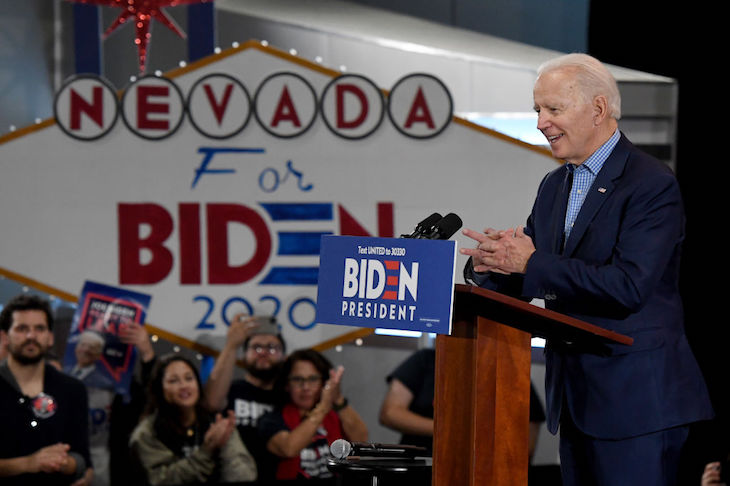In Iowa, Americans had to wait the entire night before a caucus winner was declared. Today in Nevada, the wait was much, much shorter – with barely four per cent of the state’s precincts reporting, Bernie Sanders was announced as the victor. That the result was declared so decisively and so early on, was a fitting illustration of how superior the senator’s get-out-the-vote organisation was on the ground. Democratic voters in Nevada know Bernie, and they like what they see.
While MSNBC’s Chris Matthews was comparing a Bernie Sanders victory in the Democratic primaries to the fall of France in 1940, Bernie’s supporters were jubilantly celebrating a big win in a state with diverse demographics. Iowa and New Hampshire are states with overwhelmingly white electorates and are not at all representative of the Democratic electorate as a whole. Nevada, however, is the exact opposite of an Iowa or New Hampshire. For a candidate to win in Nevada, he or she must do one of two things: capture respectable support from whites, Latinos, and African Americans (the three largest demographics in the state), or sweep the board with white voters regardless of age, gender, educational attainment, and income. Either route will land a candidate a decent place in the polls, but the former is seen as a far more respectable path to victory than the latter.
Joe Biden was banking on a better performance in Nevada than he put up in Iowa and New Hampshire, where he was relegated as a non-factor. In typical Biden fashion, the former vice president gathered in front of his fans to pat his campaign on the back for a job well done. “We are alive, and we are coming back, and we are going to win,” Biden told supporters in the ballroom. Whether the old politician genuinely believes what he was saying, was trying to keep hope alive, or was putting lipstick on a pig depends on whom you ask. But with every contest that wraps up, one gets the sense that the Democratic party has moved on from Barack Obama’s first lieutenant, in favour of a progressive populist. Biden will likely stay in the race through Super Tuesday regardless of the outcome in South Carolina, the next state to vote. But if the veep doesn’t win the Palmetto State by double digits, you have to wonder when Biden’s financial backers will throw up their hands and switch their support to a candidate who is actually in contention.
If there was one major disappointment of the night, that trophy went to Massachusetts Senator Elizabeth Warren, who had one of her most aggressive performances on the debate stage in Las Vegas three days before the vote. Warren was like a gladiator, jousting with multi-billionaire Michael Bloomberg about the claims of sexual harassment at his company, and taking her fellow senator, Amy Klobuchar, to task for an amateur healthcare proposal. By the time the two-hour debate was over, pundits on television were praising Warren for her tenacity and intellect as strongly as they were blasting Bloomberg for being unprepared and inept. And yet, when the night was over, Warren proved unviable in many of Nevada’s precincts. She was at 10.3 per cent, a distant fourth-place, by the time this post was published. Warren, who was ascendant in the summer and fall, is now at risk of being seen as a second-tier candidate.
Next stop: South Carolina. Sanders, the Democratic frontrunner, doesn’t have to win the state. After three strong performances in Iowa, New Hampshire, and now Nevada, the progressive icon who has built a nationwide movement has put himself in a position his competitors could only dream of. Members of the Democratic political establishment are shaking in their boots, distraught and puzzled that a democratic socialist could win the party’s nomination and perhaps hand Donald Trump a second-term in November.
Sanders and his legion of diehard, enthusiastic supporters grumble at that smug assertion, and insist that the senator’s turnout operation will be more than enough to reclaim the White House for the Democratic party. We will soon learn who is right.






Comments